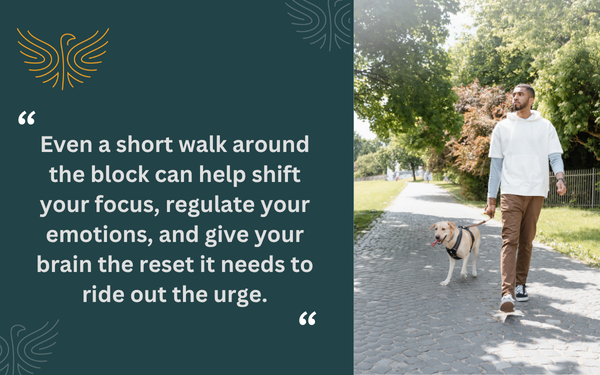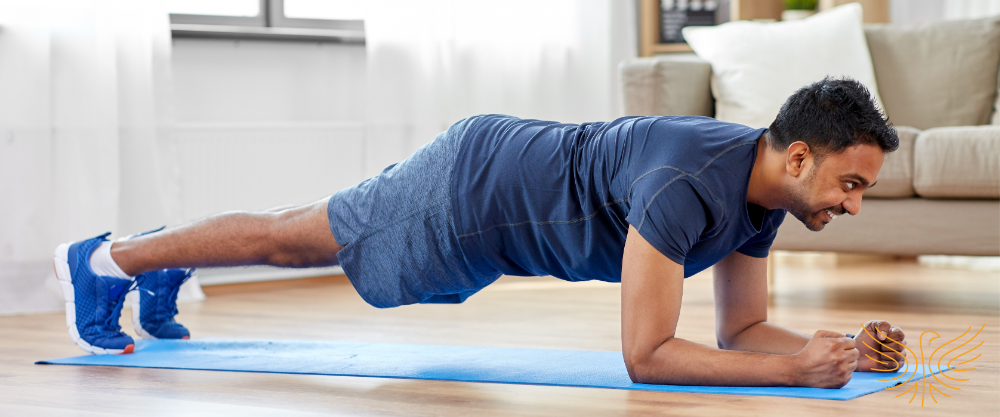If you’re in recovery, you’ve likely felt how hard and fast cravings can hit, sometimes without warning. They might show up during a stressful day at work, when boredom creeps in, or as you pass a place associated with your past habits. In early recovery, these moments can feel especially overwhelming, since your usual ways of coping are no longer an option.
But here’s the encouraging part: cravings don’t last forever. And surprisingly, a little bit of movement can help! Even a short walk around the block can help shift your focus, regulate your emotions, and give your brain the reset it needs to ride out the urge. So, how can you thwart cravings with exercise? Keep reading to find out!

_______________________________________________________
What Are Cravings?
Cravings are intense urges that feel both physical and mental. Your body might feel restless or tense, while your mind becomes laser-focused on the idea of using. In many ways, it’s your brain falling back on what it learned over months or even years—seeking relief or stimulation through familiar patterns.
Common triggers include stress from daily life, certain places that hold memories, specific people you used to use with, or difficult emotions like loneliness, anger, or sadness. Sometimes cravings also appear for no obvious reason, which can be particularly frustrating.
The important thing to remember is that you can’t always avoid cravings—they’re a normal part of recovery. However, you can change how you respond to them. And this is where exercise can be a powerful and accessible tool.
_______________________________________________________
How Exercise Helps Combat Cravings
Moving your body goes beyond burning calories. In fact, exercising has the potential to change your brain chemistry in positive ways that can help reduce cravings.
For instance, exercise increases feel-good chemicals, such as dopamine, serotonin, and endorphins. There are many of the same neurotransmitters that substances artificially stimulate. But exercise helps your brain produce them naturally.
At the same time, physical activity reduces stress hormones, such as cortisol, helping you feel calmer and more in control. This is especially important during recovery because stress is one of the biggest triggers for cravings and relapse.
Regular movement also builds resilience—your ability to handle difficult situations without reverting to old patterns. Each time you choose to go for a walk instead of giving in to a craving, you’re rewiring your brain to respond differently to stress and triggers. With continued persistence and practice, exercise can become a type of coping mechanism all in itself, supporting you when times get tough and helping you turn to a healthy habit when emotions run high.
In fact, research supports this! Studies show that exercise can help improve inhibition and reduce cravings, such as those who have struggled with heroin or meth addiction.
What Kind of Exercise Should You Do?
The best kind of exercise is one that you enjoy and can stick to, as well as one that is easily accessible when cravings happen—even unexpectedly. You don’t need a gym membership, expensive equipment, or even athletic clothes to get started. The goal is simply to move your body.
Here are some options that work well for craving management:
- Walking or light jogging (even around your neighborhood)
- Dancing to your favorite music in your living room
- Yoga or simple stretching routines
- Hiking, biking, or swimming (if these are accessible to you)
- Basic strength training using your body weight (such as push-ups, squats, lunges, etc.)
Some people find that more intense exercise works better for them—the endorphin rush from a hard workout can be particularly effective for managing cravings. Yet, consider starting where you are, not where you think you should be. If you haven’t exercised in years, a 10-minute walk is perfect. If you’re already active, you might find that increasing intensity during difficult periods helps manage cravings more effectively.
Lastly, here are a few more tips to help you when cravings hit:
- Start small and low-pressure. Even a quick five to 10-minute walk can be enough to break the craving cycle.
- Have a go-to routine. Know in advance what kind of movement helps you most, so you can act quickly.
- Pair movement with music. Listening to your favorite playlist while walking or stretching can further boost your mood.
- Use movement as a reset. Cravings usually fade within 20 minutes—and exercise helps you ride out that wave.
- Keep it accessible. Choose activities you can do anytime, anywhere.
- Celebrate consistency over intensity. Regular movement is more important than pushing yourself too hard. In fact, going too hard can leave you discouraged, sore, and less likely to continue with it.
- Track how you feel. Make a note of how your mood and cravings change after moving—it can help you stay motivated.
- Be kind to yourself. If you miss a day or the craving feels strong, don’t give up. Each moment is a new chance to choose differently.
If you or a loved one is currently struggling with addiction, the Freedom Recovery Centers (FRC) team is here to help. We answer our phones 24/7. When you’re ready, call us at 804-635-3746. You don’t have to do this alone.
.svg)






.svg)

.svg)



.svg)
